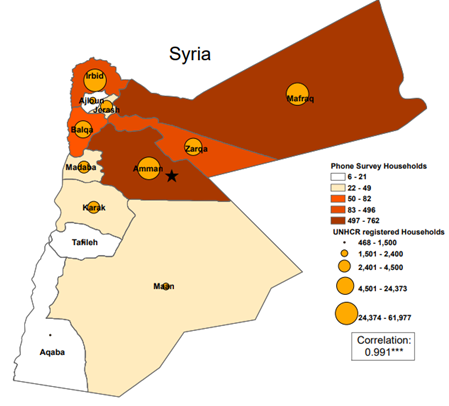 Tirachardz / Freepik
Tirachardz / Freepik
This blog is a biweekly feature highlighting recent working papers from around the World Bank Group that were published in the World Bank’s Policy Research Working Paper Series. This entry introduces 4 papers published from February 16 to February 28 on various topics, including tax compliance, high speed internet and refugees.
The first three papers we introduce bring technology and the internet to the center stage. In Electronic Payment Technology and Tax Compliance: Evidence from Uruguay’s Financial Inclusion Reform, Anne Brockmeyer and Magaly Sáenz Somarriba study the effect of financial incentives on the adoption of electronic payment technology and on tax compliance by firms. In The Impact of Internet Access on Innovation and Entrepreneurship in Africa, Georges V. Houngbonon and coauthors investigates the effects of access to high-speed internet on innovation and entrepreneurship in Africa. In Infrastructure Quality and FDI Inflows : Evidence from the Arrival of High-Speed Internet in Africa, Justice Tei Mensah and Nouhoum Traore investigate how the arrival of high-speed internet in Africa triggered foreign direct investment into the banking and technology services sectors.
-
Electronic Payment Technology and Tax Compliance: Evidence from Uruguay’s Financial Inclusion Reform explores if digitization of transactions in an economy increase tax compliance. More specifically, the paper uses administrative data and policy variation from Uruguay to show that consumer value-added tax rebates for credit and debit card transactions trigger an immediate 50 percent increase in the number of card transactions; firms’ use of card machines increases only on the intensive margin; and tax compliance is unaffected.
-
The Impact of Internet Access on Innovation and Entrepreneurship in Africa investigates the effects of access to high-speed internet on innovation and entrepreneurship in Africa by analyzing the staggered arrival of submarine internet cables to the coast of Africa and the subsequent rollout of terrestrial fiber network across the continent. The paper shows a positive effect of access to high-speed internet on innovation at the firm level, with availability of digital skills within the firm playing a key role in the internet-innovation nexus. Findings also include evidence of internet-induced entrepreneurship: the probability that a household establishes a non-farm business increases when connected to the internet. The increase in entrepreneurial activities is largely concentrated in the service sector. Figure 1a (below) shows a positive cross-country correlation between the Internet access and the share of micro-small-and-medium scale enterprises (MSME’s) using E-commerce platforms for trading, thus suggesting that the Internet provides a platform for small firms to trade. Figure 1b also shows that higher Internet access is associated with higher rates of innovation across countries.
Figure 1 Relationship between Internet Access, E-Commerce and Innovation

-
Infrastructure Quality and FDI Inflows : Evidence from the Arrival of High-Speed Internet in Africa examines the arrival of high speed internet in Africa and how it triggered FDI into the banking and technology services sectors. The paper shows that access to high-speed internet induces FDI into the banking and technology sectors. However, the impact pertains mainly to countries with access to reliable electricity, thus highlighting the role of complementarities in the impact of infrastructure.
The final paper we introduce explores the very timely topic of war refugees. In The Syrian Refugee Life Study: First Glance, Sandra V. Rozo and coauthors present descriptive statistics from the first wave of the Syrian Refugee Life Study (S-RLS), which was launched in 2020. S-RLS is a longitudinal study that tracks a representative sample of 2,500 registered Syrian refugee households in Jordan. It collects comprehensive data on socio-demographic variables as well as information on health and well-being, preferences, social capital, attitudes, and safety and crime perceptions. This study uses these novel data to document the socio-demographic characteristics of Syrian refugees in Jordan, and compare them to those of the representative Jordanian and non-Jordanian populations interviewed in the 2016 Jordan Labor Market Panel Survey. The findings point to lags in basic service access, housing quality, and educational attainment for the Syrian refugee population, relative to the non-refugee population. The impacts of the pandemic may serve to partially explain these documented disparities. The data also illustrate that most Syrian refugees have not recovered economically from the shock of COVID-19 and that this population has larger gender disparities in terms of income, employment, prevalence of child marriage, and gender attitudes than their non-refugee counterparts. Finally, mental health problems are common for Syrian refugees in 2020, with depression indicated among over 61 percent of the population.
Figure 2 illustrates the number of households registered with UNHCR in 2020 (the S-RLS sampling frame) and the number of households in the longitudinal S-RLS study. The majority of the S-RLS sample (85 percent) is concentrated in four governorates: Amman, Mafraq, Zarqa, and Irbid.
Figure 2: S-RLS Sampling Frame

The following are other interesting papers published in the second half of February. Please make sure to read them as well.
- Rohingya Refugee Camps and Forest Loss in Cox’s Bazar, Bangladesh : An Inquiry Using Remote Sensing and Econometric Approaches (Dampha,Nfamara K,Salemi,Colette,Polasky,Stephen)
- Improving Multi-Topic Household Surveys for Better Transport Policy Analysis (Lebrand,Mathilde Sylvie Maria,Yin,Qiuyan)
- A Gender Employment Gap Index (GEGI) : A Simple Measure of the Economic Gains from Closing Gender Employment Gaps, with an Application to the Pacific Islands (Pennings,Steven Michael)
- Macroeconomic Consequences of Natural Disasters : A Modeling Proposal and Application to Floods and Earthquakes in Turkey (Hallegatte,Stephane,Jooste,Charl,Mcisaac,Florent John)
- Assessing the Impact of the 2017 PPPs on the International Poverty Line and Global Poverty (Jolliffe,Dean Mitchell,Mahler,Daniel Gerszon, Lakner,Christoph, Atamanov,Aziz, Tetteh Baah, Samuel Kofi)



Join the Conversation